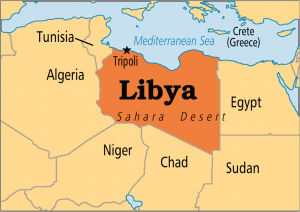
Libya marked the fourth anniversary of the uprising against Colonel Gaddafi’s 42-year-old brutal regime on Feb.17, 2015.
However, this year Libyans are not celebrating the anniversary as they used to in the past.
The mood is one of desperation as a pall of gloom now descends over Libya.
Four years ago, inspired by the Arab spring uprising in Tunisia and Egypt, thousands of Libyans took to the streets to demonstrate against their eccentric ruler, to put an end to his autocratic rule, with the sole hope of establishing a free, democratic and prosperous Libya.
However, the dreams of Libyans have now been shattered and the state has descended into chaos.
To make matters worse is the presence of ISIS. Libya has become a safe haven for the ISIS militants, who have successfully managed to gain a foothold in the country.
The current situation in Libya more or less resembles the situation in Iraq, another prominent stronghold of the radical militants.
The Islamic state, which has wreaked havoc in the war-ravaged Middle Eastern states like Iraq and Syria, has set its sights firmly on the oil rich North African country, and Libya’s collapse into anarchy is a big advantage for ISIS.
ISIS has been present in Libya for many months. A number of Islamist militant groups have been active in the country since the fall of Gaddafi in 2011, but the threat they posed received little or no attention from the international community and successive Libyan governments.
The lack of a unified government and strong state institutions helped ISIS to gain a foothold in Libyan cities.
They signalled their entry into the country with a high profile attack on a luxury hotel in the capital city of Tripoli in January.
However, the most brutal one came earlier this month, when they beheaded 21 Egyptian Coptic Christians.
This prompted neighbouring Egypt to launch a series of airstrikes on the Islamic State strongholds in the Libyan city of Derna.
The instability in Libya is forcing the country to face a new intervention by regional and international forces, as the state itself now lacks the capacity to address their problems on its own.
Although the attacks launched by Egypt were aimed at IS targets, they also resulted in the death of several innocent civilians.
The air strikes on Libyan citizens in one way is an assault on Libya’s sovereignty, but the chaos and instability plaguing the country are forcing regional players like Egypt to take unilateral action.
Above all, similar attacks on Libyan soil will only worsen the lawlessness of the state, which in turn gives ISIS ample opportunities to strengthen its presence there.
The crisis in Libya is unfolding into an international one. Its high time Libyan leaders and the international community acknowledged this reality.
The support of international community is crucial for Libya in the struggle against the rise of the Islamic State.
